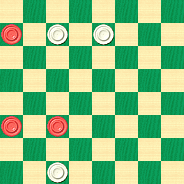The Checker Maven
Jump to navigationA Checker Hutzler

We're not personally acquainted with any modern-day checker analogue to the traditional pool hustler, but we know for sure that, at least in times past, such a thing did in fact exist, and no doubt exists somewhere today. Old Bennie Newell himself (your editor's grandfather) hustled checkers in his tavern in Newark, New Jersey, many decades ago, and there certainly were many others.
We don't know if the author of today's problem, a checkerist of yore named Henry Hutzler, was a hustler in anything but homonymous surname, but his composition makes a fitting entry for our Checker School series. It's deceptively simple, though not as hard as some others, and most of all, it's eminently practical and it or its like turns up in many an over-the-board contest.
BLACK

WHITE
White to Play and Win
W:W6,7,30:B5,21,22.
Forces are even, but White has a recognizable positional advantage. Is it enough to win? Mr. Hutlzer says it is, and no doubt he would have been willing to bet on it. What do you say? Make your call and then prove it before clicking on Read More to see the solution, a sample game, explanatory notes, and a most interesting quotation.![]()
Solution
The solution, sample game, and notes are from Ben Boland's Famous Positions in the Game of Checkers, with supplements by your editor and the King's Row computer program.
7-2---1, 22-25, 2-7, 25-29, 7-10---2, 29-25, 10-15, 25-22, 6-2, 22-17, 2-7, 17-14, 7-11, 5-9---A, 3, 11-7, 9-13, 7-3, 14-9---4, 15-18, 13-17, 30-26*---B, 5. White Wins.
Game: 11-15, 21-17, 9-13, 25-21, 8-11, 17-14, 10-17, 21-14, 6-10, 22-17, 13-22, 26-17, 15-18, 24-20, 4-8, 29-25, 2-6, 28-24, 6-9---C, 17-13, 10-17, 13-6, 1-10, 23-14, 17-21, 31-26, 10-17, 25-22, 12-16, 22-13, 16-19, 24-15, 11-18, 20-16, 8-12, 27-23, 12-19, 23-16, 7-11, 16-7, 3-10, 32-27, 10-14, 26-23, 18-22, 23-19, 14-17, 19-15, 22-25, 15-11, 25-29, 27-23, 29-25, 23-18, 25-22, 18-14, 22-18, 11-7, 18-9, 13-6, 17-22. Forms above position. H. Hutzler, Switcher Game, Lyman's Problem Book.
A---14-17, 15-18, 5-9, 11-7, 17-14, 18-22, 9-13, 30-26. White Wins.
B---3-7 draws by Sixth Position, see Page 68 (of Famous Positions---Ed.)
C---"Master Play" gives play on 11-15 to draw by J. Wyllie; and 18-22 as weak.
1---7-3 22-25 3-7 same---Ed.
2---6-2 leads to the same play---Ed.
3---14-9 is perhaps the best try, but White goes on to a very instructive win with 15-18 9-6 11-15 5-9 30-26 9-13 18-22 6-9 15-18 9-6 18-14 6-1 26-23 1-5 23-18 5-1 14-9 1-5 18-14 5-1 9-5 1-6 5-1 6-2 14-9 2-7 1-6. The White king on 22 holds the two Black men on 13 and 21 while the White king on 6 has the move on the Black king on 7---King's Row.
4---Not 13-17, 15-10---Ed.
5---For instance 9-6 18-22; or 21-25 18-22; or finally 9-13 18-22, and Black has nothing left to play---Ed.
The above position by Henry Hutzler may be found as No. 195 in Lyman's Problem Book. After second move it is No. 23 in Lees' Guide. The above game and position was first published in the Cincinnati (Ohio) Commercial, about 1879.
"Checkers, Not Mathematics!"---That checkers is not Mathematics (says an American Contemporary) is shown by the difference between thoroughness and exactness. In Mathematics the points involved are subject to deduction only in their regular and exact sequence. In Checkers the results are only obtained correctly by thorough comprehension of things seemingly irrelevant owing to the fact that a man may calculate one line of play accurately to a draw, but overlook the sacrifice of a piece which would allow a win by proper manipulation. The failure of many to play even a moderately good game of Checkers is due often to a misconception of the intrinsic elements of the game. ---The Draughts World.
You can email the Webmaster with comments on this article.
